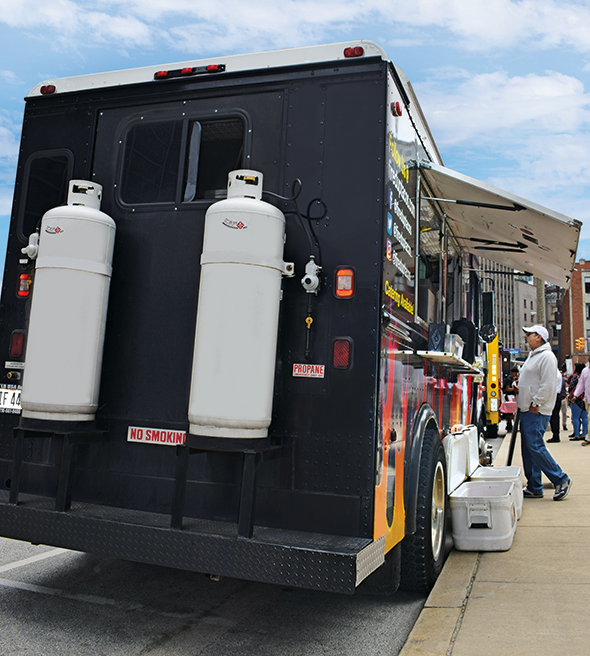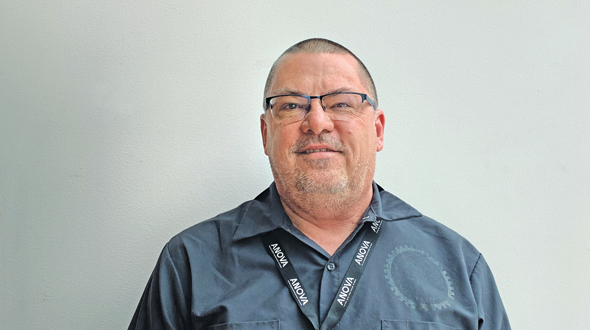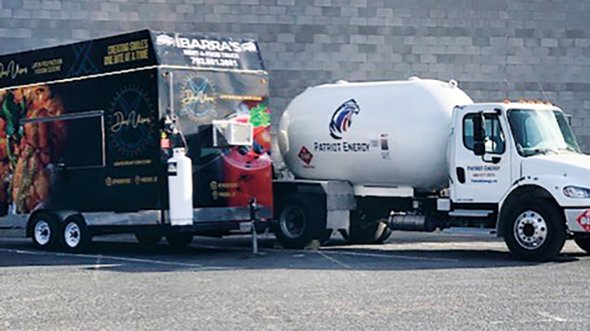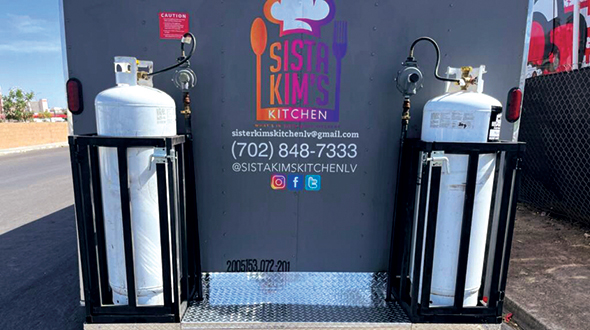Food trucks present opportunity to improve safety, boost gallon sales
Who doesn’t love a good food truck?
Having increased in popularity since the Great Recession in 2008, food trucks have become a staple of many community gatherings. And propane is often the energy of choice for food truck operators’ cooking needs.
Food trucks, or mobile food facilities, present an opportunity to propane marketers to boost gallon sales, according to Eric Smith, director of education and code development for the Nevada LP-Gas Board.

Propane is often the choice fuel for food truck operators. (Photo by LP Gas staff)
In fact, a mobile food facility may consume about 1,000 gallons of propane each year, which equals or exceeds many residential customers, Smith adds.
Additionally, providing fuel to food truck operators is a lower-cost investment for propane marketers.
“You don’t have an asset sitting there,” says Mark Orr, field inspector on the Nevada LP-Gas Board. “What could a marketer not love about this?”
He adds: “With hundreds of these mobile food facilities out there on the average of 1,000 gallons a year, there is a potential market out here in untapped fuel that we want to bring awareness to our LP marketers to help them get in on this, especially with mobile food facilities’ exponential growth.”
Safety concerns
While the market promises growth opportunities for propane marketers, it has also yielded some challenges that the industry must tackle, namely propane-related accidents caused by improper or outdated equipment and setups.
“I think you would be hard-pressed to find a person that has not eaten a tasty taco or grilled cheese sandwich from a mobile food facility,” Smith says. “Unfortunately, I think you would also find it difficult to find a person that has not heard about a fire or explosion involving a mobile food facility, including the $160 million settlement paid by U-Haul related to a mobile food facility propane explosion.”

Smith
Smith, who is also chair of the NFPA 58 Technical Committee, says these incidents have prompted an update of the code regarding mobile food facilities. He says the 2023 edition of NFPA 58 will include a new chapter that specifically addresses the gas systems on such vehicles.
“With NFPA 58, there is going to be a whole new chapter, Chapter 16,” Smith says during a presentation at the Western Propane Trade Show & Convention in May. “What we basically did is we took a lot of existing stuff out of [NFPA] 58 and moved it into a new chapter to try and make it a standalone. We’ve already petitioned the NFPA council to spin this off into its own new code.”
Major areas the new chapter will address include the LP gas containers, regulators, piping, flexible connectors and training of mobile food facility operators.
The fire suppression system and proper ventilation for grease-laden vapors is covered under NFPA 96, says Smith.
Currently, the International Fire Code requires an annual inspection of the propane systems on food trucks to be performed by a certified person or company, and the 2023 version of NFPA 58 will aim to do the same.
State-level progress

According to Eric Smith of the Nevada LP-Gas Board, a mobile food truck facility may consume 1,000 gallons a year, equal to or exceeding many residential customers. (Photo by Mark Orr)
Nevada, in particular, has already taken strides to improve the safety of propane in mobile food facilities. Las Vegas alone has about 680 licensed mobile food facilities, according to Smith, making the city somewhat of a “mecca” for mobile dining.
But what Orr noticed when he began inspecting mobile food facilities for the Nevada LP-Gas Board was improper equipment, connections and practices that ultimately made them unsafe.
“What I was finding was regular run-of-the-mill yellow gas flex lines for your home,” Orr says. “They’re single-use, non-reusable and for indoors. They’re not meant to go down the road 55, 60 miles an hour in a vehicle all day long, bouncing around.”
Orr says he began to document each time he saw improper or unsafe mobile food facility conditions related to propane. After documenting about 300 units, he went to the chief inspector, Rick Drake, and asked for permission to further investigate the root cause.
“[Drake] gave me his blessing,” Orr says. “At that time, I started searching for who was building these units and who was putting them out. Was it local or was it out of state? I was successful in finding five builders within our jurisdiction here in Nevada. I set out first to find out what they were doing and how they were doing on the LPG systems. Come to find out, we were definitely noncompliant.”
Orr’s first goal was to license all mobile food facility manufacturers with the Nevada LP-Gas Board and ensure employees were properly certified to install the propane systems. Then, the Nevada LP-Gas Board began an educational program and conducted on-site visits almost daily to help inform employees about propane.
“As I was doing this, I was coming to find out it wasn’t only the yellow flex lines they were doing,” says Orr. “They were using noncompliant regulators, too, and just all sorts of issues with the LPG system. So our goal was to flip that, get them educated and see if we could change the industry and what they were pushing out from then on. We were successful once we got [the manufacturers] licensed and got the ball rolling.”
As a result, Smith and his team collaborated with local fire departments and developed a plan to improve mobile food facility safety that has been successfully implemented at the state level in Nevada. The plan includes a form based off of the Propane Education & Research Council’s (PERC) “Gas Check” form, but it was modified to address mobile food facilities in particular. Mobile food facilities in Nevada now must be properly inspected and display a standardized decal to indicate they are compliant with the state’s guidelines.
Since the plan was enacted around October 2021, Smith and Orr agree that a tremendous amount of progress has been made in the state’s industry in a short period of time, and it impacts more than Nevada.
“I think we have four manufacturers licensed in Vegas alone,” Smith says. “I know one of them does 150 new food trailers per year, and 150 of them were coming out wrong. Now, 150 are coming out right every year, and those don’t stay in Vegas – those things get shipped all over the country. So it’s not just impacting Nevada. If they all do a similar amount, potentially 500 to 600 food trucks and trailers that are being built in this state are now correct that weren’t correct before.”
Additionally, the city of Las Vegas will offer a $2 million grant that will roll out over the next two years to mobile food facility operators in the area. Operators with a business license can apply for a grant to obtain or update propane equipment such as regulators, tanks and fire suppression systems.
“As the Nevada LP-Gas Board, we did what we were meant to do,” Orr says. “We saw a need, and we took steps to make it safer. I think we have come a long way, and if we can bring awareness nationally, then we have exceeded our goals.”
Spreading the word
The Nevada LP-Gas Board is driving a push to inform consumers, marketers and other industry members about the need to improve safety in the mobile food facility market, as well as take advantage of the increased gallon sales it promises.

Las Vegas alone has about 680 licensed mobile food facilities. (Photo by Mark Orr)
The city of Las Vegas, with assistance from the Nevada LP-Gas Board, hosted the Mobile Food Expo, which attracted about 250 participants. Among those attendees were 115 potential business owners who do not currently have a mobile food facility but were interested in the steps needed to acquire one, Orr says.
The board also meets biweekly to discuss mobile food facility safety with the City of Las Vegas Fire & Rescue, Southern Nevada Health District, City of Las Vegas Business License Department and the Clark County Fire Department.
Smith says he hopes the success the Nevada LP-Gas Board has experienced in a short time is a testament to how feasible it is to take the guidance and requirements to a national level.
“There’s an opportunity for PERC to create a national program that’s the same for everybody on mobile food facility safety,” Smith says. “No different than they’ve developed [for] a program like the entry level driver training or the CETP programs. Now they can develop a simple one for food truck operators and take this thing nationally, and I think we can within a year or two. If everybody gets on board, this problem is just going to fade away.”
















